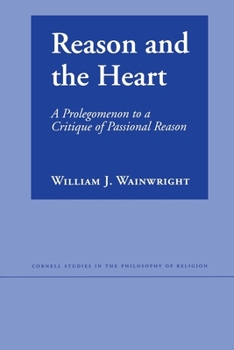Reason and the Heart: A Prolegomenon to a Critique of Passional Reason
Select Format
Select Condition 
Book Overview
Between the opposing claims of reason and religious subjectivity may be a middle ground, William J. Wainwright argues. His book is a philosophical reflection on the role of emotion in guiding reason. There is evidence, he contends, that reason functions properly only when informed by a rightly disposed heart.The idea of passional reason, so rarely discussed today, once dominated religious reflection, and Wainwright pursues it through the writings...
Format:Paperback
Language:English
ISBN:0801473489
ISBN13:9780801473487
Release Date:October 2006
Publisher:Cornell University Press
Length:176 Pages
Weight:0.62 lbs.
Dimensions:0.5" x 6.3" x 9.0"
Customer Reviews
1 rating
An Unusual Book
Published by Thriftbooks.com User , 16 years ago
Prof. Wainwright has written an unusual book supporting the philosophical position known as evidentialism. Outside of the "hard sciences" and math, the basis for having an explanation that has force is not based primarily on inductive or deductive reasoning. Other elements inform one's explanations and understandings. He notes "As Newman and James have shown, temperament, passion, intuition, and sentiment affect the beliefs we take as basic and our attitude toward evidence." Newman has written extensively about illative reasoning, and James about the relevance of "the will to believe" or, so to speak, pragmatic reasoning. His arguments are compelling when one considers the incessant drumbeat of the atheists and secular humanists that religious beliefs are unreasonable. Many claim, "We have reason; you have mere faith, a species of irrationality where wishes are affirmed as truth." Prof. Wainwright marvelously resists this "spin" and places reason under a magnifying glass, building on the work of gifted predecessors, the ones I have already mentioned as well as Jonathan Edwards. The opponents of religious faith have established a straw man definition of reason that would make it impossible for the reasonableness of religious claims or explanations to reach the threshhold of "rigor" that irreligionists seem to require. Rather, he manages to demonstrate that religious faith is both reasonable and has force. There is good reason to believe that there is warrant in religious belief; however, even arguments deficient in warrant could be more true than warranted statements. Prof. Wainwright reverses the old axiom and shows that a good defense can be one's best offense. By setting a rigid and impossible threshhold for defining what (correct/valid) reasoning is, irreligionists have, it seems, made it impossible (in an arbitrary way) to justify the epistemic validity of faith. So, Prof. Wainright has not taken the tack of countering that the absolute claims of a faithful Christian are just...well,...absolutely true, and that religion's critics just don't understand. Instead, he shows that a case for religion's truth can be made without throwing revelation in the face of God's critics. Thus, I recommend this book as the height of generosity, diplomacy, and kindness while at the same time filled with reasonable philosophical truths. Only a sophisticated reader of philosophy would enjoy this work.




